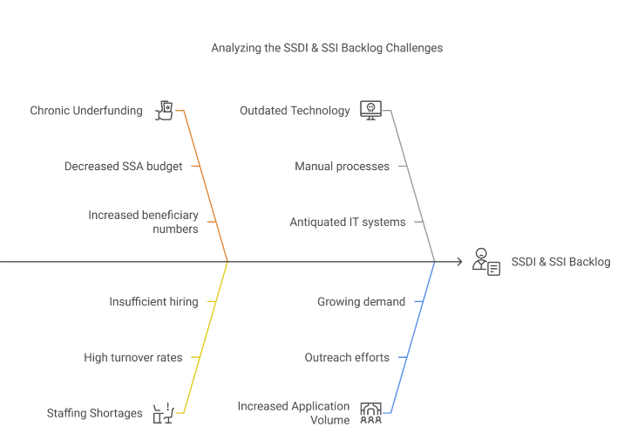
- Chronic Underfunding: SSA’s administrative budget has decreased by 19% since 2010 (adjusted for inflation), while the number of beneficiaries has grown by 25%. This funding gap has led to understaffing and reduced resources for processing claims.
- Staffing Shortages: High turnover rates, retirements, and insufficient hiring have left SSA and state-level Disability Determination Services (DDS) offices understaffed, resulting in extended processing times.
- Manual Processes and Outdated Technology: SSA still relies on antiquated IT systems and manual processes, which slow down claim adjudication.
- Increased Application Volume: Outreach efforts to increase disability claims, combined with growing demand, have overwhelmed the system, with over 1 million pending claims.
- Pandemic Aftermath: Office closures during the COVID-19 pandemic disrupted operations, causing delays that persist today.
Current Efforts to Address the Backlog
- Budget Advocacy: SSA urges Congress to approve increased funding as part of the President’s FY25 budget request to address staffing and resource shortages.
- Technological Upgrades: Deployment of the IMAGEN platform, which analyzes medical records to expedite case reviews. Over half of cases now use this tool. Modernization of IT systems is being prioritized to replace outdated technologies.
- Operational Changes: Reducing the “lookback” period for past work experience from 15 to 5 years allows DDS offices to use prior medical decisions from other SSA programs for faster determinations.
- Staffing Support: Sending SSA teams to assist DDS offices in states with the greatest need, expanding the pool of medical consultants for case reviews and fostering partnerships between high-performing DDS offices and those struggling with backlogs.
- Transparency Initiatives: SSA has begun providing state-by-state backlog data to identify problem areas and allocate resources more effectively.
- External Assistance: Organizations like RCA are helping claimants navigate the process by preparing thorough applications and managing financial strain during long waits.
Despite these efforts, average wait times remain at seven months or longer for one decision in a three-decision process, highlighting the need for sustained improvements in funding, staffing, and technology to resolve the backlog fully.
As SSA workforce reductions create new challenges in timely certifications, it’s more important than ever to have a trusted partner to help patients navigate the system efficiently. At RCA, we specialize in identifying at-risk dollars and guiding eligible individuals through complex enrollment processes—ensuring no patient falls through the cracks. These delays have a downstream impact and threaten the integrity of key hospital funding programs like 340B and Disproportionate Share Hospital (DSH), which rely on accurate, timely eligibility data. Let us help your organization reduce administrative burdens, recover critical revenue, and protect essential program qualifications. Contact RCA today to learn how our expertise can safeguard your revenue cycle amidst a changing federal landscape.

Leave A Comment
You must be logged in to post a comment.